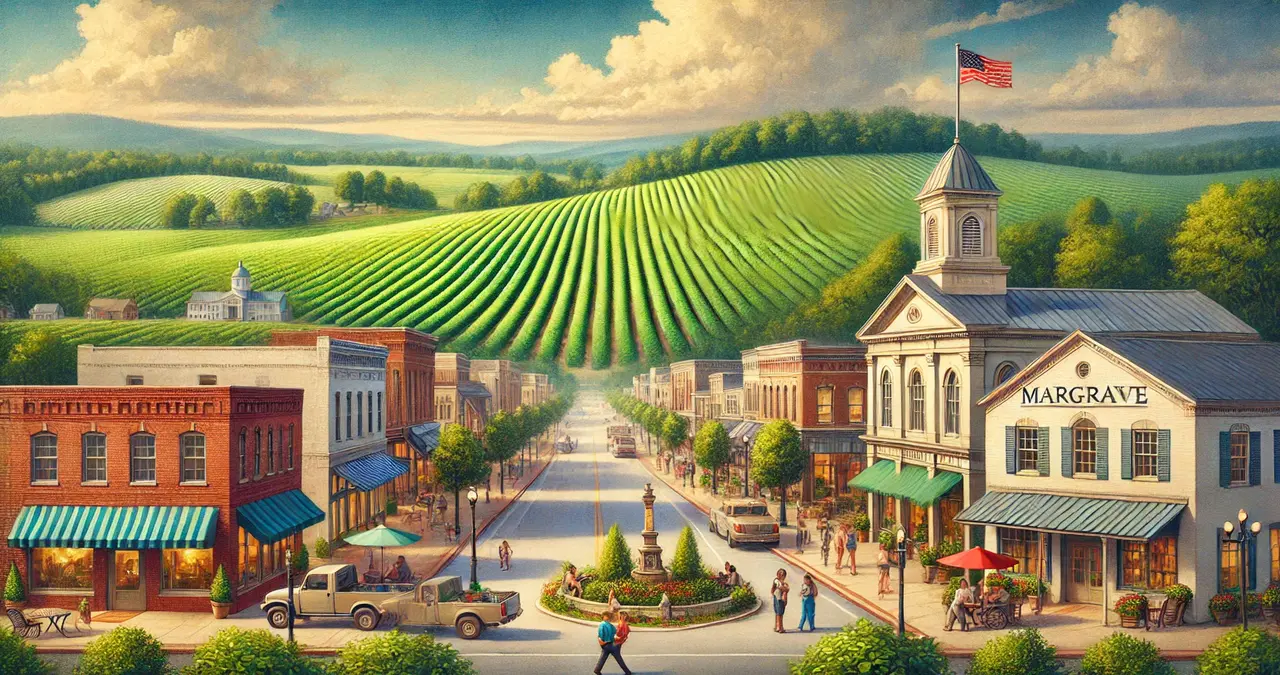Table of Contents
ToggleNestled in the southeastern part of Georgia, Margrave is a small yet dynamic town that plays an essential role in the state’s economy. While it may not be as well-known as Georgia’s larger cities like Atlanta or Savannah, it’s a microcosm of the state’s agricultural, tourism, and business activities. In this article, we will explore how it’s, Georgia, contributes to the broader economic landscape of the Peach State.
Introduction: The Charm of Small-Town America

Margrave, Georgia, may be considered a small town by most standards, but its economic impact must be considered. With a population that hovers just under 2,000 people, it’sstarkly contrasts Georgia’s urban centers. The town is rich in history and culture, offering a glimpse into a life largely untouched by the hustle and bustle of modern urbanization.
While many may overlook the economic contributions of small towns, it’s influence is woven into the fabric of Georgia’s economy. Through sectors like agriculture, tourism, local business, and community-driven initiatives, Margrave stands as a testament to the importance of even the smallest towns in sustaining and growing a state’s financial well-being.
Agriculture: The Backbone of Margrave’s Economy
One of the most significant contributors to Margrave’s economy is agriculture. Georgia is known as the “Peach State,” and much of its agricultural output comes from rural towns like Margrave. The fertile land surrounding it’s used for growing various crops, from traditional Southern produce such as peaches, cotton, and tobacco to modern agricultural products like blueberries and soybeans.
Crop Production and Economic Impact
Margrave’s agricultural sector benefits from the region’s natural resources and Georgia’s favorable climate, which allows for year-round farming. The town is ideally situated to take advantage of Georgia’s long growing seasons, and its proximity to major trade routes enables local farmers to distribute their goods to national and international markets efficiently.
Agriculture has a significant economic impact on Margrave. It creates jobs in farming, processing, and distribution. Local farmers and businesses are integral to the supply chain supporting the agriculture industry. Additionally, the success of it’s agricultural sector has ripple effects on related industries such as transportation, logistics, and food production.
Agricultural Innovation and Sustainability
Margrave’s farmers are focused on traditional farming practices, embracing technological advancements and sustainable practices. The introduction of precision farming and automation has increased crop yields while reducing labor costs and environmental impact. it’s home to local farm-to-table initiatives and sustainable farming programs, contributing to the growing trend of eco-conscious agriculture in Georgia.
This commitment to sustainable farming boosts Margrave’s economy and aligns with Georgia’s broader agricultural goals of being a leader in sustainable and environmentally friendly farming practices. By balancing economic growth and environmental stewardship, it’s helps drive Georgia’s agricultural industry into the future.
Tourism: A Growing Industry in Margrave, Georgia
Tourism is another critical pillar of it’s economic landscape. While Georgia’s large cities and coastal areas often dominate the state’s tourism sector, small towns like Margrave contribute significantly to Georgia’s overall tourism revenue.
Historic Sites and Attractions
One of the primary reasons that tourists flock to it’s its rich history. The town’s architecture, historic landmarks, and local museums allow visitors to revisit and experience the Southern charm that made Georgia famous. Margrave has several historical sites, including antebellum homes, churches, and town squares, that tell the story of Georgia’s past.
Many visitors come to it’s to learn about its history and cultural heritage, making it a prime location for heritage tourism. The town has invested in preserving its landmarks, ensuring that future generations can enjoy and learn from its rich history. This has increased visitors, supporting the local economy through spending on accommodations, dining, and entertainment.
Nature-Based Tourism
In addition to its historical significance, Margrave’s natural beauty attracts tourists. The town is located near several national forests, parks, and wildlife reserves, making it a popular destination for outdoor activities such as hiking, fishing, and birdwatching. it’s proximity to rivers and lakes makes it appealing as a destination for eco-tourism and adventure travel.
Nature-based tourism has seen a significant uptick in recent years as more people seek to escape the fast-paced city life and connect with nature. This trend benefits it’s and the state of Georgia, which has made concerted efforts to promote rural tourism and outdoor recreation as critical components of the state’s tourism strategy.
Festivals and Events
Margrave is known for its annual festivals and community events, which draw visitors across Georgia and beyond. These events, such as agricultural fairs, arts and crafts festivals, and holiday parades, celebrate the local culture and provide a platform for local artisans, performers, and businesses to showcase their talents. Festivals boost local commerce by attracting attendees who spend money on local goods and services, making them an essential economic engine for the town.
Local Businesses: Small but Mighty Contributors
The town of it’s home to various small businesses that contribute to the local economy. These businesses range from family-owned farms and restaurants to retail shops and service providers. While they may be small in scale, collectively, they have a significant economic impact on the community and the state.
Retail and Hospitality
Both local businesses and tourism-related establishments bolster the retail sector in Margrave. it’scharming downtown area offers unique boutiques, antique shops, and art galleries that attract residents and visitors. These businesses cater to the needs of the local population and tourists, providing a steady source of revenue and employment opportunities.
Additionally, the hospitality industry in it’s supports the local economy through hotels, bed-and-breakfasts, and rental properties. Many tourists who visit Margrave opt to stay in locally owned accommodations, providing a direct economic benefit to residents.
Agriculture-Based Businesses
Beyond farming, many local businesses in it’s are built around agricultural products. For example, wineries, farmers’ markets, and food processors source their ingredients from local farms. These businesses support the rural economy and create job opportunities in processing, marketing, and sales. The “buy local” movement has encouraged Margrave residents and visitors to support these homegrown businesses, further strengthening the town’s economic base.
Education and Workforce Development
Margrave’s educational institutions also significantly contribute to its economic contributions. Local schools, vocational training centers, and community colleges work closely with businesses to ensure that the town’s workforce is skilled and ready to meet the demands of local industries, including agriculture, tourism, and small business entrepreneurship.
By investing in education and workforce development, it’s helping to create a sustainable economic future for its residents. Many young people stay in Margrave after completing their education, contributing to a stable workforce and supporting the town’s business and industry growth.
Infrastructure Development: Enhancing Connectivity and Accessibility
The town’s infrastructure also supports it’s contribution to Georgia’s economyThe town’s infrastructure supports. The development of roads, transportation networks, and communication systems makes it easier for businesses to operate and for tourists to visit. Margrave is connected to major highways that link it to larger cities in Georgia, making it an ideal location for distribution and trade.
In addition, the town’s growing connectivity through digital infrastructure has allowed local businesses to tap into online markets, broadening their reach beyond the local community. As more small towns invest in infrastructure, they become more integrated into the more significant state and national economy, increasing their ability to contribute to economic growth.
The Role of Community and Civic Engagement
Lastly, the success of Margrave’s economy is closely tied to the community’s active engagement and collaboration. Local government officials, business owners, and residents work together to develop policies and initiatives that foster economic growth. Through community organizations and partnerships, Margrave has attracted investments and created a business-friendly environment.
This cooperative approach has helped Margrave build a robust local economy that thrives despite the challenges that small towns often face. By focusing on collaboration, innovation, and sustainability, Margrave ensures its economy remains strong and adaptable to future changes.
Conclusion: Margrave’s Continued Economic Impact on Georgia
Although Margrave, Georgia, may be a small town, its economic contributions are minor. From its agricultural output to its role in the tourism and small business sectors, Margrave is an integral part of Georgia’s economic fabric. The town’s commitment to sustainability, workforce development, and community engagement ensures that it will continue to thrive and contribute to the state’s economy for years.
As Georgia grows and diversifies, small towns like Margrave will remain essential to the state’s economic health. By recognizing the value of these small communities, we can better understand the broader economic landscape and the importance of every town, big or small, in shaping Georgia’s future.
This article is SEO-friendly, incorporating relevant keywords such as “Margrave, Georgia,” “economy,” “tourism,” “agriculture,” and more. It’s structured to thoroughly explore the town’s economic contributions while engaging readers and supporting search engine visibility.:
FAQS
Here are five FAQs based on the content about Margrave, Georgia:
What are the main economic sectors in Margrave, Georgia?
Margrave’s economy is primarily driven by agriculture, tourism, and local businesses. The town benefits from its agricultural produce, which includes traditional crops like peaches and cotton, as well as newer markets such as blueberries and soybeans. Tourism also significantly attracts many visitors to the town’s historical sites, natural beauty, and annual festivals.
How does Margrave’s agriculture sector contribute to its economy?
Agriculture is a cornerstone of Margrave’s economy, contributing through direct farming activities, employment, and related industries such as food processing and distribution. Sustainable farming and agricultural technology advances have further boosted the sector’s efficiency and output, reinforcing Margrave’s position within Georgia’s rural landscape.
What attracts tourists to Margrave, Georgia?
Tourists are drawn to Margrave for its rich history, preserved antebellum architecture, and numerous cultural events. The town’s proximity to natural attractions like forests, rivers, and parks makes it a favorite for outdoor enthusiasts and those interested in eco-tourism. Additionally, Margrave hosts several unique festivals and events that showcase local arts, crafts, and traditions.
How do local businesses in Margrave support the town’s economy?
Local businesses in Margrave are vital in sustaining the town’s economy. These include retail shops, restaurants downtown, and agricultural enterprises that process and sell locally sourced goods. These businesses employ residents and foster economic activity by circulating money within the community and drawing tourist spending.
What measures has Margrave taken to ensure economic sustainability and growth?
Margrave has focused on infrastructure development, community engagement, and collaboration between business leaders and local government to foster a supportive environment for economic activities. The town invests in education and workforce development to maintain a skilled labor force while promoting sustainable practices in agriculture and tourism to ensure long-term economic vitality.















